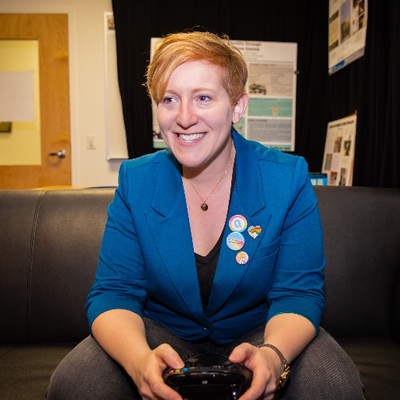I’m excited to be teaching this summer a new course that I designed for the Gender & Women’s Studies department. It’s titled “Gender and Sexuality in Digital Cultures,” but it might as well be called “Sex on the Internet.” Topics range from cybersex to internet sex work to sex in online games. Though I’ve taught new media issues before, and I’ve certainly taught sex/gender in literature, this is the first time I’ll be bringing my sex tech expertise into the classroom. It should be pretty damn interesting, more than a little risqué, and a lot of fun.
It’s wonderful to find that this kind of work, which I’ve done in a less academic setting for so long, is being welcomed by my departments. Gender & Women’s Studies has been immensely supportive; Berkeley’s new media program has also expressed enthusiasm. In the spring, I’m presenting a cybersex paper at the American Comparative Literature Association Conference, which will be part of an entire panel on intimacy and technology. I’m very curious to see how the students themselves respond. At the least, I’m hoping they’ll come to see the internet in a new, and of course sexier, light.
Here’s the official course description:
The digital world may seem like an unlikely place to explore bodies. We move through the internet as mouse-clicker and text-typers, checking our fleshier personas at the screen. However, when we look closer, our digital lives are full of complicated issues of gender and sexuality — just like “real” life. On social media sites we perform our genders through language instead of looks. In forums and comment sections we face sexism. While playing online video games, we take on the role of hyper-masculine characters or their sexualized female counterparts. Web communities provide us with spaces for exploring our sexualities, while one-on-one sex in virtual worlds allows us to re-create our bodies and desires through avatars. Meanwhile, the phenomenon of user-generated content encourages us to transform our internal fantasies into instantly publishable erotica. Even the internet itself has become sexualized; we think of it as the home of contemporary pornography, and indeed an often overlooked network of digital sex workers perform behind the scenes of online erotic consumption.
In this class, we’ll explore issues of gender, sex, and sexuality that surround our contemporary digital cultures. We’ll read theoretical texts, but also take less traditional approaches to analysis: close reading websites, researching online fan communities, and playing and discussing video games. Students will engage in both critical and creative assignments, some of which will utilize social media tools like blogging. In place of a final paper, students will write a detailed “design document” proposing a new website, virtual world, or video game that tackles the problematics we’ve discussed in class.

